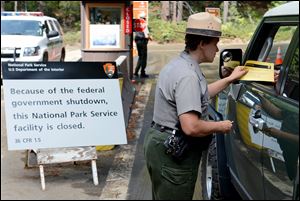
President, lawmakers convene on shutdown
No resolution reached; facilities remain closed
10/3/2013
U.S. Park Ranger Heidi Schlichting informs visitors of the closure of Yosemite National Park in California. President Obama brought top lawmakers from both parties to the White House but told them he would negotiate only after they fund the government and raise the debt limit without preconditions.
WASHINGTON — In their first meeting since a budget impasse shuttered many federal operations, President Obama told Republican leaders Wednesday he would negotiate with them only after they agreed to the funding needed to reopen the government and to an essential increase in the nation’s debt limit, without add-ons.
The President’s position reflected the White House view that the Republicans’ strategy is failing. His meeting with congressional leaders, just more than an hour long, ended without any resolution.
As they left, Republican and Democratic leaders separately reiterated their contrary positions to waiting reporters. House Speaker, John A. Boehner (R., Ohio) said Mr. Obama “will not negotiate,” while Senate Majority Leader Harry Reid (D., Nev.) said Democrats would agree to spending at levels already passed by the House. “My friend John Boehner cannot take ‘yes’ for an answer,” Mr. Reid said.
The meeting was the first time the President linked the two actions that he and a divided Congress are fighting over this month: a budget for the fiscal year that began Tuesday, and an increase in the debt ceiling by Oct. 17, when the Treasury Department will otherwise breach its authority to borrow the money necessary to cover the nation’s
existing obligations to citizens, contractors, and creditors.
Only when those actions are taken, Mr. Obama said, would he agree to revive bipartisan talks toward a long-term budget deal addressing the growing costs of Medicare and Medicaid and the inadequacy of federal tax revenues.
While the lack of a budget forced the government shutdown this week, failure to raise the debt limit would have worse repercussions, threatening America’s credit rating with a globe-shaking default and risking an economic relapse at home. Yet the refusal by the GOP-led House this week to approve government funding until Mr. Obama agrees to delay his signature health-care law — a nonnegotiable demand, he has said — raised fears from Washington to Wall Street that Republicans likewise would carry out their threat to withhold approval of a hike in the debt ceiling.
In a meeting with Wall Street executives to enlist their help, and then in an interview with CNBC before his White House meeting with congressional leaders, Mr. Obama said he needed to draw a firm line “to break that fever” in the House among hard-line conservatives who repeatedly issued fiscal ultimatums, resulting in government by crisis.
“As soon as we get a clean piece of legislation that reopens the government — and there is a majority for that right now in the House of Representatives — until we get that done, until we make sure that Congress allows Treasury to pay for things that Congress itself already authorized, we are not going to engage in a series of negotiations,” Mr. Obama told CNBC.
Mr. Boehner, under pressure from Republican conservatives and outside Tea Party groups, has declined to bring a so-called clean continuing resolution to the House for a vote because it would pass mostly with Democrats’ votes and probably prompt a conservative backlash that could cost him his leadership office.
Mr. Obama, in the interview, said he must resist the Republican demands this time because a precedent was at stake. “If we get in the habit where a few folks, an extremist wing of one party, whether it’s Democrat or Republican, are allowed to extort concessions based on a threat of undermining the full faith and credit of the United States, then any president who comes after me — not just me — will find themselves unable to govern effectively,” he said.
Many Republicans concede Mr. Obama has the political advantage in the confrontation, so some in the House reacted hopefully to the President’s summons to congressional leaders to meet late in the day. Rep. Michael G. Grimm (R., N.Y.) called the White House meeting “the beginning of the end of the government shutdown,” although others in Congress and the administration were less optimistic.
Frustrations in Congress mounted along with voters’ anger. Clusters of House Republicans filtered in and out of Mr. Boehner’s office, some pleading for him to stand firm, others seeking a face-saving end to the shutdown. Mr. Grimm said he was one of a half-dozen Republican pragmatists who urged the speaker to find a way to reopen the government.
Lawmakers who spoke with the speaker said Mr. Boehner had broached the idea of a comprehensive deficit-reduction deal that could put to rest three years of gridlock and turmoil in the Republican-led House.
Publicly, however, House Republican leaders pressed forward with a new strategy to try to throw Democrats, in particular Mr. Obama, on the defensive. They proposed bills to open those parts of the government whose closings were drawing the most criticism, a list that grew as citizens’ complaints came in.
The House on Tuesday passed measures to reopen the national parks, memorials, and federally funded museums, and to finance basic services in the District of Columbia, whose budget is supplemented by Congress. But the Senate Democrats signaled they would reject the legislation.
Today, the House planned to pass measures funding veterans’ programs and paying inactive National Guard members and reservists.
When GOP Rep. Eric Cantor of Virginia, the House majority leader, was subsequently asked how Republicans could choose to help children with cancer enroll in clinical trials, but not allow disadvantaged children to return to their Head Start classes, he replied: “That’s coming as well. We are going to take every issue that has come up and put it on the floor.”